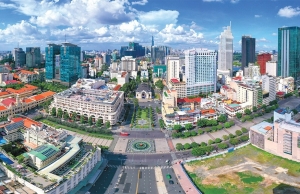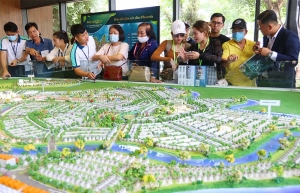Retail property market vibrant amid regional backdrop
 |
| Tran Thi Khanh Hien, head of Research, MB Securities |
This sluggish retail sales growth was mainly attributed to compressing manufacturing activities and weak consumer confidence. However, the growth of retail sales accelerated to 10.1 per cent and 9.3 per cent on-year in the last two months of 2023, after a downward trend for the previous nine months, which might indicate a recovery for the retail and service sector into 2024.
Against the weak macro backdrop, Vietnam’s retail property market still witnessed a few bright spots. According to the latest report from CBRE, Vietnam’s retail market welcomed many new projects, with nearly 111,000 square metres in Hanoi and Ho Chi Minh City.
The most prominent of these was the Lotte Mall West Lake Hanoi, inaugurated in the second half of the year. With a rental area of up to 72,000sq.m, it is the largest shopping mall of the past four years. Additionally, rental prices in two metropolitans also experienced an uptrend thanks to the entry and active expansion of high-end and luxury brands.
The rental prices of central business districts (CBD) in Hanoi and Ho Chi Minh City jumped 6 per cent and 13 per cent on-year, respectively. Meanwhile, the non-CBD retail prices even bounced higher, 28 per cent and 12 per cent on-year respectively, due to the limited supply.
In the near future, Vietnam’s retail property market is still promising thanks to the recovering consumer confidence and the influx of international brands. I believe the favourable economic outlook will strengthen consumer confidence. Vietnam’s economic growth is estimated to expand stably 6-6.5 per cent per annum over the next three years, which will bolster household disposable income and facilitate the expansion of the middle-income population.
Particularly, shopping centres are on the rise as a one-stop destination for shopping, entertainment, and food and beverages services, and are more enticing than department stores where the selection of goods and services can be limited.
Based on our observations, consumers prefer this one-stop experience to individual stores. As a result, retailers have set out to modernise the retail landscape by shifting to large shopping complexes, such as shopping centres, department stores, and retail podiums.
As an attractive destination for regional retailers, the competition in Vietnam’s retail property market is heating up. Many domestic and foreign players have either entered the market or expanded their network in Vietnam via both merger and acquisition activities and aggressive expansion, while incumbents are rapidly expanding their network in a bid to win market share.
Vincom Retail will add 160,000sq.m for rent in 2024. Meanwhile, Thailand’s Central Retail Corporation has targeted its largest overseas investment of $1.45 billion in Vietnam for the 2023-2027 period. It also aims to double the number of stores to 600 across 57 cities and provinces in the country in that time, with total floor area expected to reach two million sq.m.
Meanwhile, Japan’s AEON Group has also announced plans to develop 16 more retail projects in Vietnam, including several in Hanoi, in the next three years. THACO Group also acquired South Korea’s Emart in 2021, and looks to expand its network to 10 outlets in 2025.
In order to compete with foreign players, local retail property developers need to enhance their financial ability to capture the opportunities arising from the consumption expansion. Different to residential property, retail property developers have limited sources of funding for their projects. They are unable to get customer advance payment, thus raising capital on the equity market or bank borrowing are traditional sources of funding.
In 2019, the State Bank of Vietnam increased the risk weighting of real estate loans, including retail real estate, from 200 per cent to 250 per cent. Meanwhile, the regulated short-term funding using for long-term loan ratio has gradually been lowered from 45 per cent to 30 per cent over that period. It indicates that bank loans for real estate, including retail property, are tightening gradually.
Retail property developers have sought alternative means of funding on the equity market. However, both the stock market and corporate bond market have experienced a gloomy year. Vietnam’s stock market transaction volume contracted about 17 per cent in 2023 due to the weak sentiment of investors over the macro outlook. Meanwhile, the corporate bond market was quiet in the first half of 2023 with no issuance.
The market became more active in the second half, lifting the total corporate bond issuance value to $11.16 billion, nearly flat compared to 2022. Clearly, the silence of funding sources has posed a challenge for local retail developers trying to compete with foreign players.
 | Land law updates offer grand real estate foundation The National Assembly has approved the revised Land Law, which will come into full effect next year. |
 | Revised rules set to expand options for overseas nationals to own property New laws for next year are expected to help increase remittances into Vietnam, particularly towards the real estate sector. |
 | Fresh land law equals a brand new drive for growth Vietnam is at the juncture where the country either chooses to move forward with all possible resources or maintains the status quo but with a decreasing quality of life for its people. Vietnam has chosen the first path. |
What the stars mean:
★ Poor ★ ★ Promising ★★★ Good ★★★★ Very good ★★★★★ Exceptional
Related Contents
Latest News
More News
- Masan Consumer names new deputy CEO to drive foods and beverages growth (February 23, 2026 | 20:52)
- Myriad risks ahead, but ones Vietnam can confront (February 20, 2026 | 15:02)
- Vietnam making the leap into AI and semiconductors (February 20, 2026 | 09:37)
- Funding must be activated for semiconductor success (February 20, 2026 | 09:20)
- Resilience as new benchmark for smarter infrastructure (February 19, 2026 | 20:35)
- A golden time to shine within ASEAN (February 19, 2026 | 20:22)
- Vietnam’s pivotal year for advancing sustainability (February 19, 2026 | 08:44)
- Strengthening the core role of industry and trade (February 19, 2026 | 08:35)
- Future orientations for healthcare improvements (February 19, 2026 | 08:29)
- Infrastructure orientations suitable for a new chapter (February 19, 2026 | 08:15)

 Tag:
Tag:


















 Mobile Version
Mobile Version